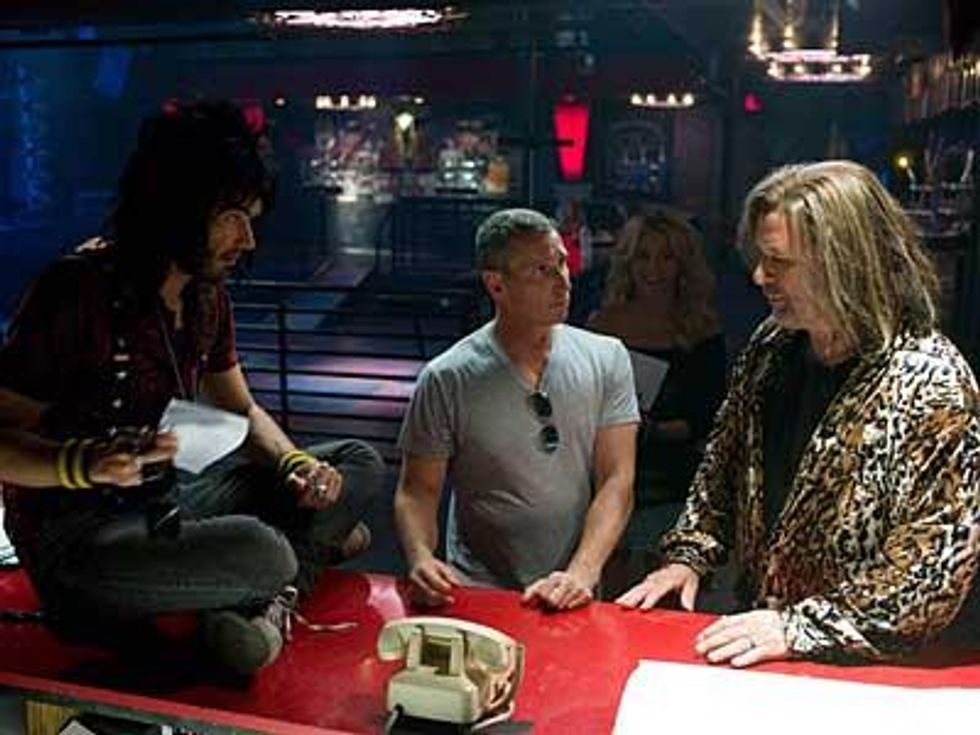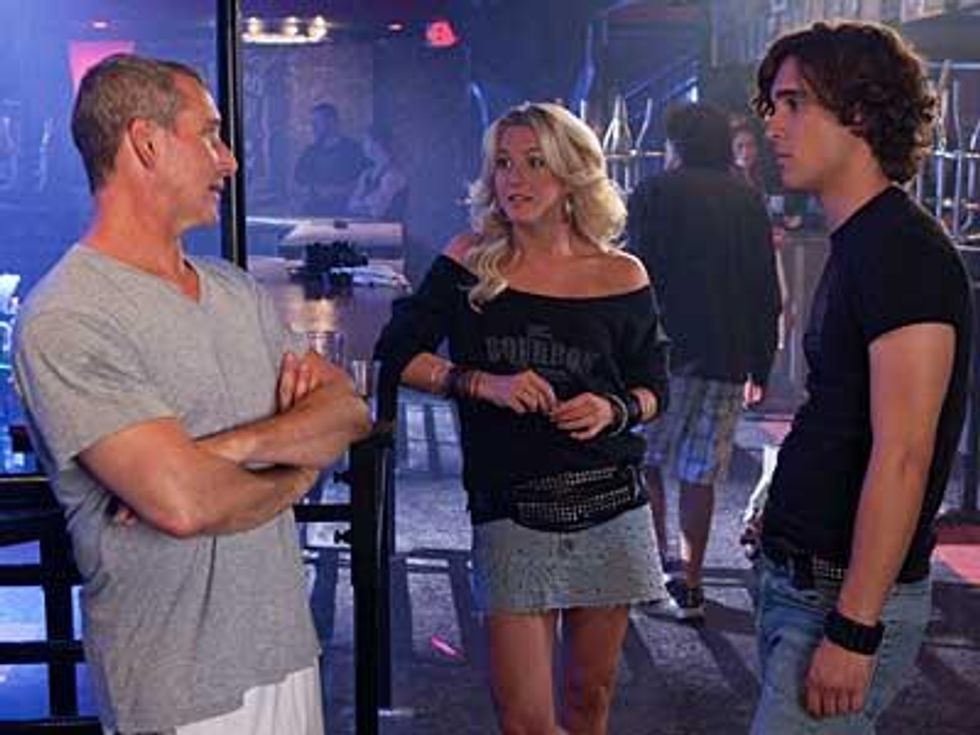
The Rock of Ages director talks about guiding Tom Cruise through his first film musical and the LGBT presence in the '80s rock scene.
June 17 2012 2:54 PM EST
By continuing to use our site, you agree to our Privacy Policy and Terms of Use.

The Rock of Ages director talks about guiding Tom Cruise through his first film musical and the LGBT presence in the '80s rock scene.
Does anyone make gayer movies than Adam Shankman? In his blockbuster musical Hairspraythe 47-year-old filmmaker put John Travolta in drag and had him whirl around the dance floor with Christopher Walken. Since then he's directed the cheeky Prop 8: the Musical, as well as numerous episodes of Glee, including the stellar tribute to The Rocky Horror Picture Show. Even in his ostensibly more hetero-friendly films such as The Wedding Planner are saturatedwith a distinctly gay sensibility. It's no wonder Shankman received Outfest's Visionary Award last September for "his contribution to LGBT arts and media visibility." With his latest, the colorful film adaptation of Rock of Ages (now in theaters), the Broadway hit comprised of '80s rock anthems, Shankman directs Julianne Hough and Diego Boneta as young lovers against a vibrant backdrop of L.A.'s Sunset Strip. However, it's Alec Baldwin and Russell Brand as club owners slowly realizing their bromance is true love and Tom Cruise as chaps-clad spaced out musician Stacee Jaxx who resonate most. Shankman tells The Advocate about guiding Tom Cruise through his first film musical, the LGBT presence in the '80s rock scene, and why The Trevor Project is so important to him.
The Advocate: What is it about Rock of Ages that made you want to make the film?
Adam Shankman: They'd asked me to do it, because we'd had a great time with Hairspray. When I saw the play it was almost difficult to watch it because the audience was so crazy. They were screaming and knew every word of every song. And a lot of them were straight. I always think about gay inclusion, but this had straight inclusion. This show brought straights into the Broadway theater and the gays were also there with open arms, so to speak, and it was amazing. I thought if I could make a musical that will include this demographic and make them feel comfortable...
Would you say this musical has a different built-in audience from other musicals?
I think in general there's a different audience for musicals period. A lot of the men I spoke to who are big Hairsprayfans saw it with their families. Not only did they like the movie, they loved the fact that it got kids to talk about discrimination at a very young age. Besides it's the music of my early 20s and it's still everywhere. "Hit Me With Your Best Shot" and "Don't Stop Believin'" are everywhere. I hear them constantly.
What changes were made in adapting the material for the screen?
There were three changes. I eliminated using Lonny [Brand's character] as the narrator because I wanted the perspective of the movie to be Sherry [Hough]'s point of view and letting her see the city be so gold and glittery and beautiful and then experiencing the consequences so she can rise up again. Number two was making the villains more emotionally and physically attached to Los Angeles and have emotional stakes in shutting down the Bourbon. Third, I made it so that Sherry doesn't sleep with Stacee Jaxx because I felt very strongly the audience could never root for her to be with Drew if she had done that. It's really easy in the play because Lonnie narrates you right through it.
The relationship between the characters played by Alec Baldwin and Russell Brand seems less ambiguous in your film.
It's more fleshed out in the film but just through one piece of action. It's almost exactly the same as it is in the play. The creators of the show perceived it differently, but I can only tell the story that I can tell. It feels like it does in the play. They described the song to me as the ultimate bromance, but I asked "Isn't the ultimate bromance actually being together?" I don't know about guys who'd sing "I Can't Fight This Feeling Anymore" about being just good friends. The funniness of this idea is what got Alec and Russell in the movie. They're both unbelievable to work with. I knew that with them the comedy would get ratcheted up so much. It's what they bring. Casting has a massive impact on the tone of the movie and how it will look and feel. I knew with these two the bar was set very high.

Speaking of setting the bar high, you directed Tom Cruise in his first film musical. How did this come about?
I told him Tropic Thunderwas his audition. It showed his level of commitment to a character. I was like now your stunts. The other thing was when he did that dance number with Jennifer Lopez on the MTV awards. I thought he dances and he can do comedy. I thought if he can sing, I'm in heaven. There's no one who will bring a level of commitment to a character like Tom. We got a voice coach and I heard it and he had this amazing rock voice that he didn't even know he had. We were freaking out, thinking this is going to work! But before that we talked about the character and decided the springboard is the lyrics to "Wanted Dead or Alive." It's this guy who is always surrounded by women, managers, monkeys, but in your head you see yourself as this lonely cowboy trudging through the desert and people are trying to steal your soul.
Tom is known for his commitment to roles. How easy was it for him to pick up the dance moves?
It wasn't easy. He worked really hard and willed that into his body. He rehearsed more than anyone I've ever worked with in my entire life. He sang more and danced harder than everyone. He takes his job very seriously. He's also an incredibly happy spirit on set by the way. He is nothing if not supportive. He was so good to Julianne and Diego and so supportive of them and in awe of their talents. He always wanted Diego to come over and practice guitar with him because they were both learning guitar for the movie.
Despite the androgynous appearance of many of the rock stars, heavy metal and hard rock doesn't seem like an accepting place for gays. During your research did you find much of an LGBT presence in that scene?
In the music scene, I don't know. There was a lot of questions about the Runaways with Lita Ford and Joan Jett. There wasn't a big gay presence. Even Freddie Mercury wasn't out back then. So there wasn't a big LGBT presence but look at Adam Lambert, the world is just a different place now. Women in that world were just accessories. There weren't even Yoko Onos in this world. It was a man's world and men were run amok.

You grew up in L.A. and your father worked in the music industry. What are your memories of that period?
I remember being on the tour bus with X. I remember Barry White and Sister Sledge having dinner at our house. I remember Paul Williams taking me to see Bugsy Malone. I remember A Taste of Honey sitting in our living room. I remember watching David Foster produce an album for Alice Cooper that was about being in an insane asylum. I remember going with David to watch Barbra Streisand record "Somewhere." It was a fantasy world.
Last fall you received Outfest's Visionary award. Do you feel a responsibility to create positive LGBT images?
What I feel is the need to not be irresponsible. I feel a responsibility to tell the truth and the truth is that not all gay guys are great. Not all straight guys are great and not all of them are bad. I just want to tell stories correctly. My movies do have a very gay sensibility to them anyway. I have a gay couple in a totally positive, healthy relationship. In HairsprayI have Chris Walken and John Travolta in a happy marriage. I don't know how much better I can do than this. At some point I would like to tell a story that exposes the difficulty of being in a gay relationship. All I can do is tell honest stories about human behavior.
You recently hosted a screening of Rock of Ages as a benefit for The Trevor Project. How did that go?
It was great. The Trevor Project is so near and dear to my heart. It's such an important organization. Dealing with suicide prevention, we just have to stop with the shame. At least on a school level we can do something. We can't go into homes and make parents be better parents and have them put restrictions on their kids' behavior, but we can do it in the schools. These kids who are feeling so alone and so outcast really need someone to talk to so it's an important organization. What was really great about the screening is a lot of people not involved with the organization showed up just to see the movie and then they got educated about Trevor Project. It was great and very moving and I cried.
Charlie Kirk DID say stoning gay people was the 'perfect law' — and these other heinous quotes